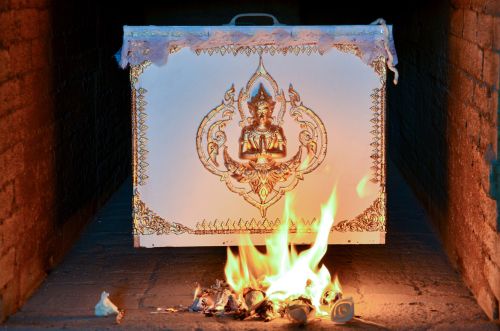 Hinduism is the third largest religion in the world after Christianity and Islam. More than 15% of the world’s population follow the traditions laid out in the Veda, the Hindu holy script, and these traditions dictate what happens during a Hindu funeral.
Hinduism is the third largest religion in the world after Christianity and Islam. More than 15% of the world’s population follow the traditions laid out in the Veda, the Hindu holy script, and these traditions dictate what happens during a Hindu funeral.
Hindu Beliefs Around Death
Hindu beliefs about death center around reincarnation. Followers believe that whenever someone dies, their soul is reborn in a different form. The soul will continue reincarnating in an effort to become closer to Brahma, the Hindu god of creation.
The way a soul reincarnates is dictated by the laws of karma. Hindus maintain that good actions in this life will bring you blessings in your next life and poor actions will bring you pain when you reincarnate. Souls may be reincarnated into heaven, hell, or a new body. Only when the soul undertakes a spiritual journey and comes closer to Brahma can it escape the cycle of reincarnation.
Cremation in Hindu Funerals
Hindus cremate the dead, believing that the body no longer serves any purpose once the soul is gone from it. They also maintain that cremation helps the soul leave the body faster.
Traditionally, Hindus are cremated along the Ganges, and family members carry the casket to the crematorium. However, funeral directors around the world should be able to accommodate Hindu funeral rites and rituals.
Hindu Funeral Rites
It’s traditional for funerals to be led by either an officiant or the oldest son of the decedent. Funerals include chants or mantras led by the officiant, who also gathers the family and friends, leading them in various customs:
- Anointing the body with ghee, honey, milk, and yogurt
- Putting essentials oils on the decedent’s forehead — sandalwood for men and turmeric for women
- Arranging the palms in a praying position and tying together the big toes
- Wrapping the body in a white sheet or, in more progressive sects, dressing it in good clothes
- Putting flowers and balls of rice around the body
- Placing a lamp near the head of the decedent or sprinkling the body with water
At a Hindu Funeral
Hindus are cremated within 24 hours after death, so embalming is unnecessary. The body generally stays at the funeral home until cremation. An open casket allows mourners to see the body, and guests are expected to view it without touching it. The service often lasts fewer than 30 minutes. Mourners are expected to wear white to the funeral.
The casket is carried to the crematorium feet first while mourners recite prayers. A Hindu priest conducts the cremation ceremony along with senior family members. Traditionally, only men are allowed to participate in the cremation ceremony, though in more modern sects, women are permitted. The day after the cremation, the family scatters the ashes over either a sacred body of water such as the Ganges River or a site that was meaningful to the deceased.
After the Funeral
The mourning period in Hinduism lasts for 10 to 30 days. The family displays a picture of the decedent surrounded by a garland of flowers. Visitors may come and share memories of the deceased and their grief over losing their loved one.
On the 13th day after the cremation, the family holds a ceremony to help cleanse the soul of the deceased and release it to be reincarnated. On the first anniversary of their loved one’s death, they hold a memorial event that honors the life of the deceased.
Hindu funeral traditions and ceremonies are an important part of their faith. Since everyone dies and is reborn again, it’s vital to help the soul along on its way to reincarnation. These beautiful rituals allow Hindus to grieve their loss and memorialize their loved ones.
Add Your Comment